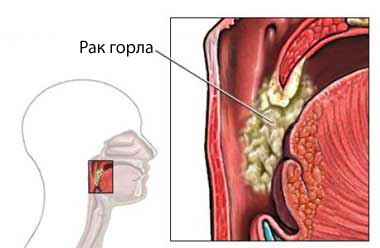Throat Cancer
Description of throat cancer
Throat Cancer – disease, in which cancer cells grow in the throat. Throat – a hollow muscular tube, that goes from the nose and mouth, down the throat to the esophagus and trachea.
Cancer occurs, where body cells (in this case the throat tissue cells) randomly divided. If cells keep dividing uncontrollably, when the body does not need new, excrescent (weight) of cloth, called a growth or tumor. The term cancer refers to malignant tumors, that can invade nearby tissues and spread to other parts of the body. Benign tumors do not spread to other organs.

Causes of throat cancer
The cause of throat cancer is unknown.
Risk factors for throat cancer
Factors, which increase the risk of throat cancer:
- Age: 40 and older;
- Paul: male;
- Smoking or use of tobacco products (masticatory, snuff);
- Excessive alcohol consumption;
- Genetic predisposition;
- Vitamin A deficiency;
- Diet low in fruits and vegetables;
- Suppression of the immune system;
- Infection, caused by certain viruses:
- Epstein-Barr virus;
- Human Papilloma Virus;
- Radiation exposure;
- Excessive consumption of dried meat or fish;
- Smoking marijuana;
- Working with some of materials and production:
- Cleaning nickel;
- Working with wood;
- Working with textile fibers.
Symptoms of throat cancer
These symptoms, except for throat cancer, They may be caused by other, less serious diseases. If you experience any of them, consult a doctor.
- Sore throat;
- The feeling in the throat seal;
- Difficulty chewing or swallowing;
- Difficulty moving the jaw and tongue;
- Hoarseness or voice changes;
- Headache, throat or neck;
- Swelling in the neck;
- Unexplained weight loss.
Diagnosis of throat cancer
The doctor will ask about your symptoms and medical history, and perform a physical examination. You may be referred to an otolaryngologist – doctor, who specializes in diseases of the head and neck.
Tests may include:
- Laryngoscopy – throat studied using a thin tube, which is inserted into it through the mouth;
- Panendoskopiya – inspection of the mouth, nasopharynx, larynx, esophagus, trachea and the use of fiber optic devices;
- Tonkoigolynaya aspiratsionnaya biopsy – Use a thin needle to remove a sample of tissue of the throat, to check for cancer cells;
- Magnetic resonance imaging (MRT) – test, which uses magnetic waves, to make pictures of structures inside the throat;
- Positron Emission Tomography (PET) – determination of the functional activity of tissues; shows, how the disease has spread beyond the throat;
- CT scan (CT) – type of X-ray, which uses computer, to make pictures of the inside of the throat;
- Incizionnaя biopsy – surgical removal of a sample of tissue of the throat, to check for cancer cells.
Treatment of throat cancer
After the discovery of throat cancer survey is conducted, allowing to determine the extent and scope of cancer. The treatment method depends on the stage of cancer.
Surgery for cancer of the throat
The surgery is performed to remove a cancerous tumor, certain tissues, and, perhaps, neighboring lymph nodes. In very rare cases, surgical removal of large tumors in the throat may also require removal of muscles, used for swallowing. As a result, food can fall into the trachea and lungs, which can cause pneumonia. Therefore, the surgeon may remove the larynx or vocal cords and trachea withdraw outwardly through the opening in the neck, to be used for breathing.
Radiation therapy for cancer of the throat
Radiation therapy uses radiation emissions, to kill cancer cells and shrink tumors. Radiation therapy may be of the following types:
- External radiation therapy – radiation is directed at the tumor from a radiation source outside the body;
- Internal radiation therapy – radioactive materials placed in the body near cancer cells.
Chemotherapy for cancer of the throat
Chemotherapy – the use of drugs to kill cancer cells. Preparations for the chemotherapy may be given in various forms: tablets, injection, the introduction of a catheter. The drugs enter the bloodstream and spread throughout the body, killing mostly cancer, and also some healthy cells.
Combination Therapy
Often, to cure cancer of the larynx and throat, Chemotherapy and radiation therapy are used together. This method of treatment can be more effective, than surgery or radiotherapy alone.
Prevention of throat cancer
To reduce the risk of throat cancer, adhere to the following:
- Do not smoke or use tobacco products. If you smoke or use tobacco products, try to quit;
- Drink alcohol only in moderation;
- Stick to a healthy diet, Low in saturated fat and more cereals, fruits and vegetables;
- See your dentist regularly and a doctor for examination and early detection of cancer.
